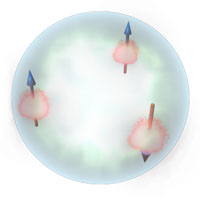Highlights
Atomic trios promise robust quantum data storage: paper in Physical Review A
Save a computer file and you may worry whether the data will have become corrupted if you return to the file years or decades later. Physicists working on designs for quantum computers are dealing with a more urgent problem: how to preserve data for long enough to complete operations and read out the result. In a new paper published in Physical Review A, CQT researchers and their collaborators assess a design for quantum data storage that could offer a million-fold improvement in lifetime over the current experimental best.
Quantum states are readily affected by properties of the environment such as stray magnetic fields. As a result, the quantum state decoheres, which equates to erasure of any stored data. With current technology, decoherence times may reach a few seconds. Berthold-Georg (Berge) Englert and Han Rui of CQT, Niels Lörch of the University of Heidelberg in Germany and Jun Suzuki from the National Institute of Informatics in Tokyo, Japan, analyse the potential lifetime of data stored in a novel 'reference-frame-free' quantum bit, or qubit, and find it could survive with 99.99% fidelity for two hours. The decoherence time would be many times longer. "The numbers assumed for what the experiments can do are quite conservative," says Berge, who is a Principal Investigator at CQT and a Professor at NUS, suggesting the lifetimes could be even longer.

A qubit stored in the combined state of three spin-1/2 atoms is resistant to perturbations from the environment, such as stray magnetic fields. This is an artist's impression of the three-atom state.
The reference-frame-free qubit consists of three closely-spaced atoms, in the joint state of which one bit of data is stored. Decoherence is slower in this system than for data stored in a single atom because the joint state is unaffected by external magnetic fields, as long as each individual atom is influenced identically. The paper by Berge and his colleagues builds on previous proposals for reference-frame-free qubits by presenting detailed calculations for how the scheme would perform experimentally, making realistic assumptions about, for example, imperfections in the arrangement of atoms and current fluctuations in the circuitry. Specifically, they examine the situation of three Lithium-6 atoms trapped in an optical lattice created by carbon-dioxide lasers.
Before pursuing this qubit design for quantum computers, however, one important piece of the puzzle remains. As CQT PhD student Han Rui explains, "We proved the qubit is robust. Now the next step is to work out smart schemes for encoding, decoding and manipulating information." The problem is part-solved: look out for the team's next papers.
For more details, see the paper "Long-lived qubit from three spin-1/2 atoms", Phys. Rev. A 84, 012322 (2011); arXiv:1008.1523.






